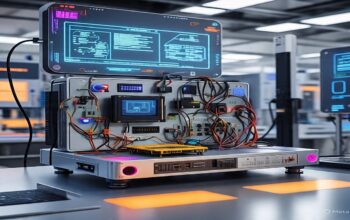It’s quite fast evolving, a really virtual world where one may interact, socialize, play, and even work. At its very center is Artificial Intelligence, at the core of that change, these AI technologies are creating the Metaverse- both real and realistic, both more interactive, and responsive. Today we take a zoom-in look into how AI is changing the Metaverse and what
to expect by 2025.
Covered Contents
ToggleWhat is the Metaverse?
Before delving into AI, understand what Metaverse is. Metaverse refers to a collective virtual space made of different interconnected digital environments, where users can interact with each other and the digital world in real-time time. It’s often depicted through virtual reality (VR) and augmented reality (AR) experiences.
This way, people can experience the events: virtual concerts, virtual shopping, video games, or working from home.
All these experiences, though, would be incomplete without the underlying power of AI.
Role of AI in Metaverse
AI is not a supplementary technology in the Metaverse but a fundamental technology that gives life to it. Here are some primary ways AI is changing the face of this digital frontier:
check it out: How AI Differs from the Metaverse
Intelligent Virtual Avatars
Avatars are the digital representations of users in the Metaverse. AI is making avatars smarter because it allows them to respond more naturally to their environment and other avatars. These AI-driven avatars, using machine learning, can learn their behavior based on previous interactions, creating a more immersive and realistic experience.
For example, AI lets avatars exhibit emotions through facial recognition or change their movements according to context, making them look more realistic.
Improved Interactions
Artificial Intelligence empowers users to connect and communicate with the digital world as well. It lets NLP enable normal conversations between the user and AI characters, including those called non-player characters (NPCs), of the Metaverse. From a virtual assistant for easy navigation to helping you select things to purchase through a shopkeeper from an online store, it makes AI work to enable smoother interaction in a much more human manner.
More than that, AI can also analyze the tone and sentiment of conversations, which permits virtual assistants to respond adequately according to mood or context.
Trends Shaping the Metaverse with AI: A Look Toward 2025
AI is testing the limits of the Metaverse, which is changing daily. By 2025, the following major trends are anticipated to influence the Metaverse:
AI-Powered Personalization:
Hyper-personalization will be one of the most thrilling trends in the Metaverse. The more data AI analyzes regarding user behavior and data, the more personalized it will become in its offerings. For instance, in virtual shopping experiences, AI may recommend products based on previous purchases or even customize avatars with unique clothing and accessories.
Users will have virtual worlds designed according to their preferences by 2025, hence, making the Metaverse more interesting.
AI-Driven Content Creation:
Creating content in the Metaverse is very challenging, but with AI, this process will be automated and enhanced. AI tools can generate virtual landscapes, design environments, and even write scripts for virtual plays or experiences. By 2025, content creation will become more accessible, allowing users to build their digital worlds with the help of AI tools.
For example, an AI may propose a personalized virtual world from your favorite colors, themes, or sounds, allowing for creative freedom even without technical skills.
Smarter NPCs and Digital Friends:
With further advancement in AI, we will see NPCs in the Metaverse become much more intelligent. They will no longer just follow a script but instead be able to make complex decisions based on what the user is doing and needs. Digital companions, which will be powered by AI, will also become a reality. Users will have personalized, engaging conversations with characters that learn and grow with them.
By 2025, NPCs and digital companions will feel more like the real thing, with much richer, more dynamic interactions than the fairly simple mechanics we see in these games today.
Predictions for the Future: What Will the Metaverse Look Like in 2025?
By 2025, AI will make the Metaverse an even more immersive and intelligent virtual world. Here are some predictions:
Real-Time Emotional AI:
AI will be able to read and react to emotions in real time. Imagine entering the Metaverse and having AI-driven avatars understand and respond to your mood. Whether it’s through your facial expressions or voice tone, the AI will adapt the interaction accordingly, creating a more empathetic virtual experience.
Seamless Integration of AR and VR:
AI will seamlessly tie AR to VR in the Metaverse, meaning you can interact with virtual objects either in the real world through AR or immerse completely in virtual reality. The result will be hybrid experiences that blend the virtual and physical worlds.
Independent Digital Economies
AI would also revolutionize virtual economies in the Metaverse. AI-powered automatic systems will ensure seamless transactions, personalized services, and fluctuating prices that adjust with user behavior and market trends. Such AI-generated economies will be self-sustaining, continually evolving, and promoting a more engaging interaction for the users.
Challenges and Ethical Considerations
AI does have endless possibilities in the Metaverse, but integrating them fast can be problematic for privacy, security, and ethics. How data would be collected to personalize these experiences will be a question in itself and pose huge challenges to user privacy. With AI taking up content moderation, identity protection, and safe interactions in virtual space, there is a serious need for regulation to prevent the worst from happening.
These will have to be addressed by 2025 with transparent policies and advanced cybersecurity measures so that the Metaverse continues to remain a safe space for all.
Conclusion:
AI is revolutionizing the Metaverse in several ways. With its capabilities to improve avatars, power natural conversations, create dynamic content, and predict user behavior, AI is transforming the way people interact with virtual worlds. By 2025, the Metaverse will thus become an immersive autonomous space and blend reality and virtuality without seams.
Check it out: How AI is changing the Job market
As AI continues to advance, the Metaverse will be the place where users can create, interact, and thrive in ways previously unimaginable.
What aspect of AI in the Metaverse excites you the most? Leave a comment below and let us know your thoughts on the future of virtual reality and AI!



2 thoughts on “How AI is Changing the Metaverse: Trends and Predictions for 2025”